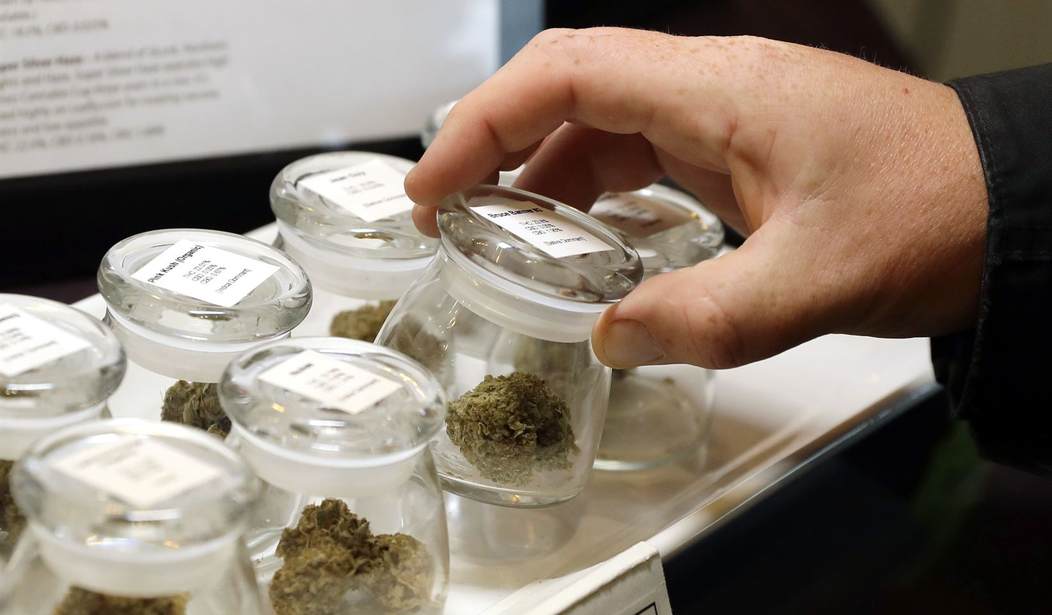Even though Merrick Garland and the DOJ are holding off on their appeal of the Fifth Circuit’s decision declaring the ATF’s ban on bump stocks a violation of the agency’s power, the Biden administration isn’t sitting on its hands entirely when it comes to defending some of the current federal gun control laws. Last Friday the agency filed its notice of appeal in U.S. v. Jared Michael Harrison, in which a federal judge in Oklahoma declared that the federal prohibition on gun ownership for users of marijuana is unconstitutional.
In his ruling, Judge Patrick Wyrick threw out charges of illegal possession of a firearm after police in Lawton, Oklahoma found a small amount of pot and a handgun in his car after a traffic stop. Harrison was facing several criminal charges in Texas at the time, and Wyrick noted in his opinion that if law enforcement had wanted to ensure that Harrison stayed away from guns while he awaited trial, the state of Texas had the opportunity to try to keep him behind bars.
None of this is to say that the government cannot play a role in protecting the public from dangerous persons possessing firearms. It can, and it should. For example, if the State of Texas thought that Harrison’s alleged involvement in a shooting demonstrated that Harrison was a danger to the public, it could have demonstrated to a Texas judge—in an individualized proceeding of which Harrison would have been given notice and the opportunity to be heard—that Harrison ought to be jailed while awaiting trial for that shooting. The Constitution, after all, permits pre-trial detention, and such detention would be a highly effective means of furthering the government’s interest in protecting the public from a gun-toting Harrison. But that didn’t happen; Harrison was released pending trial in Texas. And so here we are, with the federal government now arguing that Harrison’s mere status as a user of marijuana justifies stripping him of his fundamental right to possess a firearm. For all the reasons given above, this is not a constitutionally permissible means of disarming Harrison.
As to why § 922(g)(3) is a violation of Harrison’s Second Amendment rights, Wyrick pointed out that none of the supposed historical analogues offered by DOJ amounted to a complete prohibition on gun ownership, even though there were plenty of ordinances and state laws that prohibited the use of a firearm while intoxicated. Wyrick also declared that the government’s argument that the Second Amendment only protects “law-abiding citizens” is so open-ended that even a minor traffic violation could be cause to terminate your right to keep and bear arms.
Imagine a world where the State of New York, to end-run the adverse judgment it received in Bruen, could make mowing one’s lawn a felony so that it could then strip all its newly deemed “felons” of their right to possess a firearm. The label “felony” is simply “too easy for legislatures and prosecutors to manipulate.”
Remarkably, when presented with this lawn-mowing hypothetical argument, and asked if such an approach would be consistent with the Second Amendment, the United States said “yes.” So, in the federal government’s view, a state or the federal government could deem anything at all a felony and then strip those convicted of that felony—no matter how innocuous the conduct—of their fundamental right to possess a firearm. Why? Because courts must defer to a legislature’s judgments about what is and is not a felony, says the United States. It’s as if Bruen’s command regarding the inappropriateness of such deference to legislative judgments has been lost in translation.
In a sense, one must applaud the United States for its steadfast commitment to its legal position. But “giv[ing] legislatures unreviewable power to manipulate the Second Amendment by choosing a label” is inconsistent with the entire point of constitutionalizing a fundamental right in the first place: to restrain a legislature’s ability to infringe that right through legislation. What would remain of the Second Amendment if the Court were to accept the United States’ view that a legislature could prohibit the exercise of the right it protects simply by declaring anything or everything a felony? Nothing. Maybe that is what the federal government desires, but it is hardly what the Constitution requires.
The DOJ wasn’t required to lay out its defense strategy in its notice of appeal, but I don’t expect Garland and company to completely overhaul their arguments. This is the case they want to make, after all; that Congress and state legislatures have the open-ended power to declare any act serious enough to cause you to forfeit your Second Amendment rights. And this doesn’t just apply to felonies. Democrats in states like California are also trying to add to the list of misdemeanor offenses that would result in a loss of Second Amendment rights, though SB 368 theoretically allows for those rights to be restored after ten years.
While U.S. v. Harrison is specifically about the federal ban on gun ownership by “unlawful” users of marijuana (even in those states where medical or recreational use is allowed), it’s part of a much broader legal battle over who, exactly, are the “people” whose right to keep and bear arms shall not be infringed. The Biden administration wants to bar as many Americans as possible from accessing their Second Amendment rights, but I doubt they’re all that eager to test that argument out before SCOTUS at the moment. Appealing Harrison to the Tenth Circuit doesn’t come with too many immediate risks for the Biden administration, and if the appeals court ends up backing Wyrick’s original decision Garland can always appeal en banc to keep the case away from the Supreme Court for awhile longer. If the Tenth Circuit overrules Wyrick and upholds Harrison’s conviction, on the other hand, the Court will almost certainly be asked to weigh in immediately. Either way, the gun prohibitionists won’t be able to keep Harrison away from the justices forever, and this isn’t the only case bubbling up from lower courts dealing with the constitutionality of the federal law on prohibited persons either. Sooner or later SCOTUS is going to have to address the Biden administration’s assertion that virtually any legal transgression could be used as the basis to deny an individual their Second Amendment rights, but the gun prohibition crowd would love to stall the inevitable until Democrats have had the chance to swap out the current pro-2A majority with one hostile to our right to keep and bear arms.








Join the conversation as a VIP Member